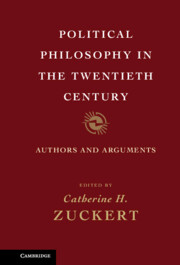Crossref Citations
This Book has been
cited by the following publications. This list is generated based on data provided by Crossref.
2012.
Books Received.
Philosophy,
Vol. 87,
Issue. 2,
p.
319.
Keefe, Rosaleen
2013.
Common Sense Rhetorical Theory, Pluralism, and Protestant Natural Law.
Journal of Scottish Philosophy,
Vol. 11,
Issue. 2,
p.
213.
Henderson, Juliet
2018.
Post-critical writing praxis as a qualitative researcher.
International Journal of Qualitative Studies in Education,
Vol. 31,
Issue. 6,
p.
535.
MacKay, Joseph
and
LaRoche, Christopher David
2018.
Why Is There No Reactionary International Theory?.
International Studies Quarterly,
Baroš, Jiří
2018.
The Crisis of Liberal Democracy and the Concept of the Common Good.
Studia theologica,
Vol. 20,
Issue. 2,
p.
129.
Hiruta, Kei
2019.
Arendt on Freedom, Liberation, and Revolution.
p.
1.
Lutz, Mark J.
2019.
Living the Theologico-Political Problem: Leo Strauss on the Common Ground of Philosophy and Theology.
The European Legacy,
Vol. 24,
Issue. 2,
p.
123.
Risse, Mathias
2020.
On Justice.
Carley, Robert F.
2023.
The Cultural Production of Social Movements.
p.
133.



